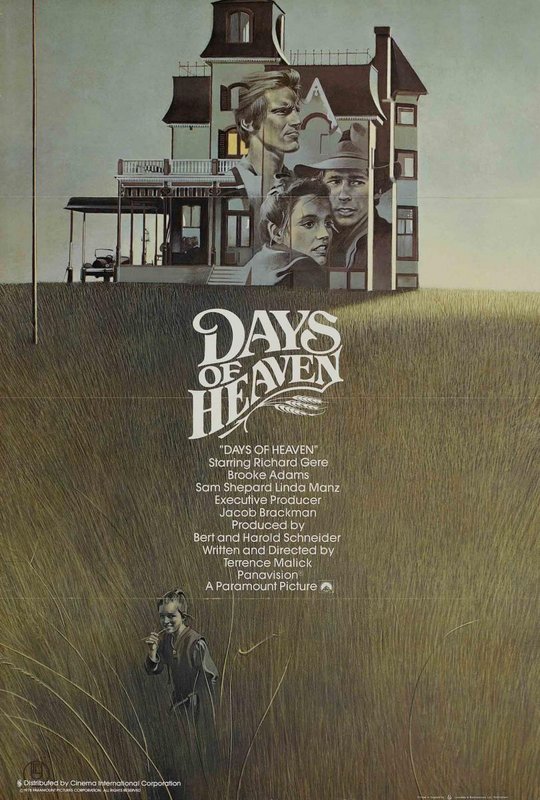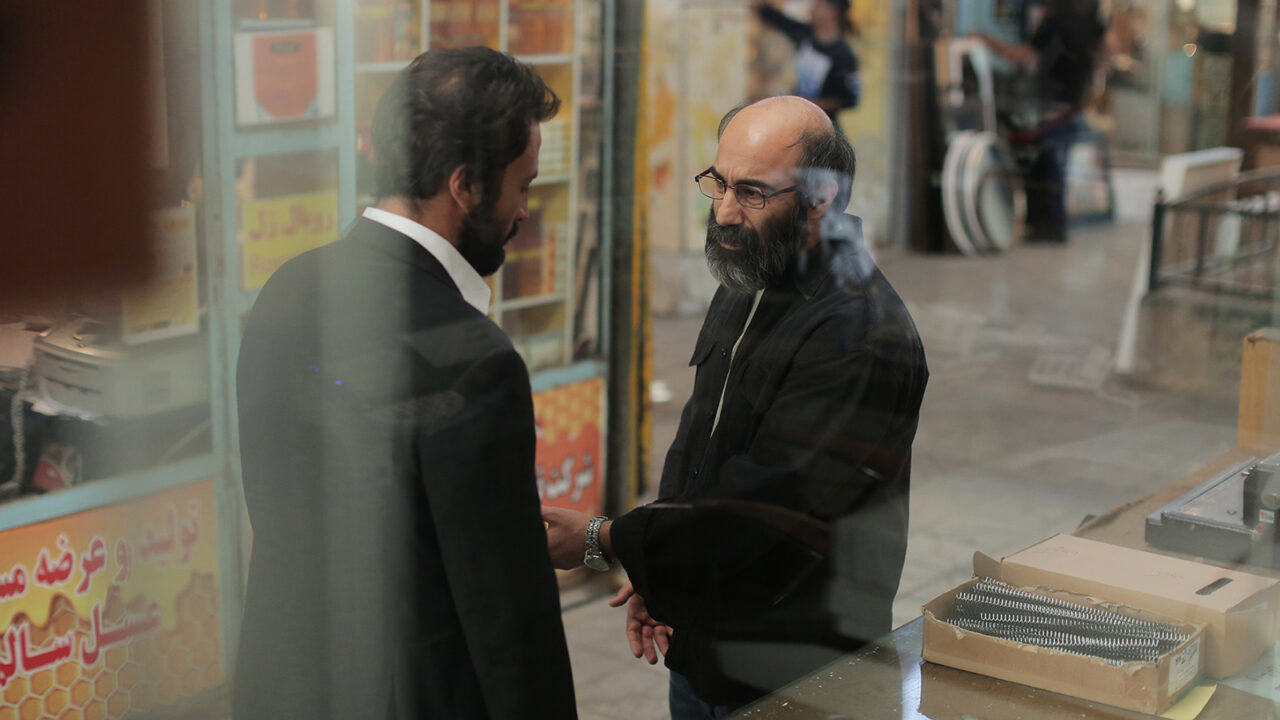
Days of Heaven - 1978
Directed by Terrence Malick
Written by Terrence Malick
Starring Richard Gere, Brooke Adams, Sam Shepard, Linda Manz
doesn't quite come off to perfection, but there are elements of it that work so well as to make the film notable and memorable. It's an optical feast, and so much effort went into the visual aspect of it's storytelling that you could nearly watch it muted and walk away with the same impression as those who have heard it with dialogue. It wouldn't come as any surprise to learn that this is a film which features a great deal of narration - I don't know of many Terrence Malick films that don't, but what
is surprising is that this narration, delivered by a young Linda Manz, wasn't initially planned for before the film entered the editing phase of it's production. This is a Malick film which had a problem at that stage - the narrative was muddled, and the fact that the director did away with the screenplay and asked the actors to "find the story" meant he had to find the story himself in an editing room with 2-time Oscar nominee Billy Weber. It would take two years of work, and some added inserts, to turn this into a coherent whole.
It's 1916. Bill (Richard Gere), his sister Linda (Linda Manz) and girlfriend Abby (Brooke Adams) are on the run after Bill kills a man in a fight at the steel mill he was working at. They end up being hired to work on a wheat farm in Texas. The farm's owner (Sam Shepard) isn't well, and one day Bill overhears a doctor telling him he only has around a year to live. With this information, Bill encourages his girlfriend (whom he is passing off as his sister) to seduce the farmer in the hopes the two might be married, and inherit the valuable land they're working on. Eventually, Abby does - the farmer easily falls in love with her and the two are married. Now, the lives of Bill, Linda and Abby are easy - they no longer have to work, and have a stately house to live in - but despite this Bill finds it hard to keep his hands off Abby, and the more the farmer sees the two of them interacting when they don't know he's watching, the more he realises how he's being duped. A confrontation is in the air, and with emotions running at a fever pitch combined with Bill's propensity for violence, the results will be dramatic.
It's the cinematography that's most noteworthy when it comes to
Days of Heaven. The look of the film has been achieved primarily by the use of natural light over and above artificial lighting - and doing this made the images on the screen differ from the glossy and fake look most films have. The sky and landscape takes on a hue that seems to belong on canvas, and the bright shining blue becomes pink, white, grey and purple - especially since many shots were filmed during "magic hour" - and darkness often shrouds the figures moving about, since reflective surfaces weren't utilized as they normally would be. People's faces are shadowed in way that looks quite unlike most other films - but everything feels all the more recognizable to us. All perfectly natural. The entire crew thought cinematographer Nťstor Almendros and Malick were either crazy or performing their jobs in an absolutely amateur manner - as if the two had no idea of what they were doing. Almendros had to leave before the production ended, as he had a prior engagement with FranÁois Truffaut, about to direct
The Green Room.
It's slightly contentious that Nťstor Almendros won an Oscar for this film, because a great deal of the camerawork was done by Haskell Wexler after Almendros had left. After having more time to think things over, Wexler decided that Almendros deserved it after all - as it was him who had set all the trends, and decided exactly how to film this motion picture. All the second cinematographer had done was continue along the same track. Everything is filmed
wonderfully by both cinematographers - the composition, balance and especially the placing of what's in the foreground and background of every shot. It's a real pleasure, and continually engages the senses. Nearly every shot is quite simply beautiful. Terrence Malick films would come to be renowned for the quality of cinematography in them, despite utilizing various different talents in that area - usually Oscar winners, and usually nominated for whatever film they'd collaborated with him on.
The score is likewise majestic and alluring, from the legendary Ennio Morricone - earning him his first ever Academy Award nomination. To me it sounds kind of haunting as well - if my life were set to this music I'd feel that there was something always looming over me, just as the main house on the farm in this film constantly looms over the people who work there. You could almost score a horror film in a similar manner - but often the musical accompaniment to what's happening breaks out into lyrical tunes that reflect the golden fields of wheat, and playful actions of the workers who constantly engage in horseplay and energetic reveling. It matches the cinematography in a way that defines
Days of Heaven as a technically brilliant film that could nearly have been an art-piece devoid of narrative or dialogue. This is a film that seems to have been guided by these principles above and beyond narrative ones - and that is probably why Malick had such a hard time editing what he had into a coherent story until he added the narration.
Days of Heaven also managed to garner Oscar nominations for it's Sound and Costume Design - again, elements that lean more towards craft than performance or story. There is a solid story there, and this isn't a film that simply exists as a mood piece - although it consists of long stretches that rely more on mood than dialogue or plot. Unusual, though, is the way twists and turns in the story occur almost in the background - not completely lost to the audience, but a little more detached than you'd normally see in a film. Again, some moments play out as if we're watching a silent film, with looks, facial expressions and body language imparting the importance of a moment. The narration isn't as clumsy as it might have been in the hands of a lesser talent - and is shrouded in Linda's feelings, moods and the typical minutia of a young girl's thoughts. It buttresses the dialogue and story, and provides context, and if I didn't know better I'd swear that the film was originally written this way and was always meant to look and sound exactly like this.
I came away from
Days of Heaven much more affected by the look and sound of it than I did from the story it told - and I felt somewhat removed from the ultimate fate of Bill and the farmer who marries his girlfriend. I'm kind of surprised by that, considering just how dramatic their stories are. I felt something for Linda, because she's the only character we really get to know - and I think this is the little problem
Days of Heaven has been left with. It's a great movie, but it wasn't perfect, and I think Malick tried and tried to make it so. In the end, he had to leave filmmaking for 20 years due to the extended effort and ultimate frustration and defeat. For him, I don't think this being a really good movie sufficed - especially when certain aspects of it came out incredibly well. I feel pretty much the same way about it. It's well worth having in one's Criterion Collection and watching any number of times - but it fell short of complete success, and stands as a kind of Leaning Tower of Pisa. Beautiful but with a fundamental flaw that many a cinephile might notice, but easily forgive.
I got to know Terrence Malick's films middle-to-back-to-front, starting with
The Thin Red Line, continuing on and then only later going back into time and seeing his much-heralded first two films. It's such an odd filmography with that huge gap. His films are like poems, and
Days of Heaven is no less poetic than the others, despite the unintentional nature of it's narration-driven, one-step-removed narrative and it's visual and auditory brilliance. If pushed to choose a favourite, I'd go for
The Thin Red Line - every aspect of that film feels assured and works exactly as it was meant to.
Days of Heaven is really, really beautiful, and I like it, but I need to connect with it's central characters more than I eventually do. The rogue and the honest man betwixt the beautiful woman with deep emotions who is pushed and pulled and never quite allowed to simply be who she is. Nevertheless, it's still easy to enjoy - like a stunning painting of turn-of-the-century farm life that has come to life with motion and music, and the hulk of a mansion on the horizon. Built from the inside out for the film, it's the mansion that comes to mind when you think of
Days of Heaven - a potent metaphor, but I think we should have come away thinking of the characters first, and the rest second.
/cdn.vox-cdn.com/uploads/chorus_image/image/71743417/theverdict_twentiethcenturyfox.0.jpg)
/cdn.vox-cdn.com/uploads/chorus_image/image/71743417/theverdict_twentiethcenturyfox.0.jpg)


